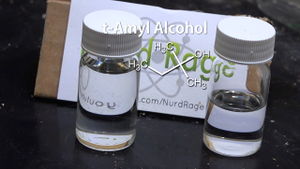Difference between revisions of "Tert-Amyl alcohol"
| Line 8: | Line 8: | ||
| OtherNames = 2-Methyl-2-butanol<br>2-Methyl-2-butyl alcohol<br>Amylene hydrate<br>Dimethylethylcarbinol<br>TAA<br>t-Amylol<br>t-Pentylol<br>tert-Amyl alcohol<br>tert-Pentyl alcohol | | OtherNames = 2-Methyl-2-butanol<br>2-Methyl-2-butyl alcohol<br>Amylene hydrate<br>Dimethylethylcarbinol<br>TAA<br>t-Amylol<br>t-Pentylol<br>tert-Amyl alcohol<br>tert-Pentyl alcohol | ||
<!-- Images --> | <!-- Images --> | ||
| − | | ImageFile = | + | | ImageFile = Tert-Amyl alcohol low purity forerun high purity end run by NurdRage.jpg |
| − | | ImageSize = | + | | ImageSize = 300 |
| ImageAlt = | | ImageAlt = | ||
| ImageName = | | ImageName = | ||
| + | | ImageCaption = Low purity forerun (left) and high purity end run (right) tert-amyl alcohol, obtained via [[Grignard reaction]] route. | ||
| ImageFile1 = | | ImageFile1 = | ||
| ImageSize1 = | | ImageSize1 = | ||
| Line 116: | Line 117: | ||
===Physical=== | ===Physical=== | ||
| − | ''tert''-Amyl alcohol is a colorless liquid, with a camphor-like odor. It is somewhat soluble in water, but miscible with other organic solvents. | + | ''tert''-Amyl alcohol is a colorless liquid, with a camphor-like odor. It is somewhat soluble in water, but miscible with other organic solvents, like alcohols and halocarbons. |
==Availability== | ==Availability== | ||
Revision as of 16:49, 18 February 2018
 Low purity forerun (left) and high purity end run (right) tert-amyl alcohol, obtained via Grignard reaction route.
| |
| Names | |
|---|---|
| IUPAC name
2-Methylbutan-2-ol
| |
| Other names
2-Methyl-2-butanol
2-Methyl-2-butyl alcohol Amylene hydrate Dimethylethylcarbinol TAA t-Amylol t-Pentylol tert-Amyl alcohol tert-Pentyl alcohol | |
| Properties | |
| C5H12O CH3CH2(CH3)2C(OH) | |
| Molar mass | 88.15 g/mol |
| Appearance | Colorless liquid |
| Odor | Camphor-like |
| Density | 0.8096 g/cm3 (20 °C) |
| Melting point | −9 °C (16 °F; 264 K) |
| Boiling point | 102.4 °C (216.3 °F; 375.5 K) |
| 12 g/100 ml | |
| Solubility | Miscible with acetone, diethyl ether, benzene, chloroform, ethanol, glycerol, oils |
| Vapor pressure | 1.6 kPa (at 20 °C) |
| Thermochemistry | |
| Std molar
entropy (S |
229.3 J·K−1·mol−1 |
| Std enthalpy of
formation (ΔfH |
−380.0–−379.0 kJ/mol |
| Hazards | |
| Safety data sheet | Sigma-Aldrich |
| Flash point | 19 °C (66 °F; 292 K) |
| Lethal dose or concentration (LD, LC): | |
| LD50 (Median dose)
|
1,000 mg/kg (rat, oral) |
| Related compounds | |
| Related compounds
|
tert-Butanol Pentanol |
| Except where otherwise noted, data are given for materials in their standard state (at 25 °C [77 °F], 100 kPa). | |
| Infobox references | |
tert-Amyl alcohol (TAA) or 2-methyl-2-butanol, is the tertiary alcohol isomer of pentanol, with a variety of uses in chemistry.
Contents
Properties
Chemical
tert-Amyl alcohol, like all tertiary alcohols resists oxidation to aldehyde or carboxylic acid.
Physical
tert-Amyl alcohol is a colorless liquid, with a camphor-like odor. It is somewhat soluble in water, but miscible with other organic solvents, like alcohols and halocarbons.
Availability
tert-pentanol is sold by chemical suppliers.
Can also be extracted via fractional distillation from fusel oil.
Preparation
tert-Amyl alcohol can be prepared via the bromoethylethylmagnesium Grignard with acetone route.
Projects
- Preparation of metallic potassium
- Make good smelling compounds
Handling
Safety
tert-Amyl alcohol is flammable and should be handled with care. It is also 20 times more psychoactive than ethanol, with a similar effect but leaning more towards sedation. It is almost non-toxic.
Storage
In closed bottles
Disposal
Can be safely burned.